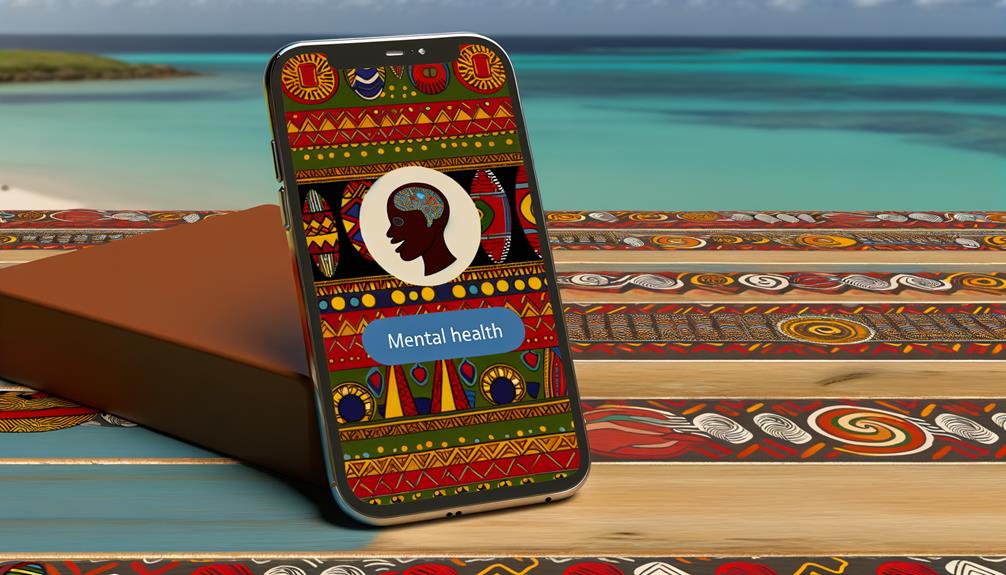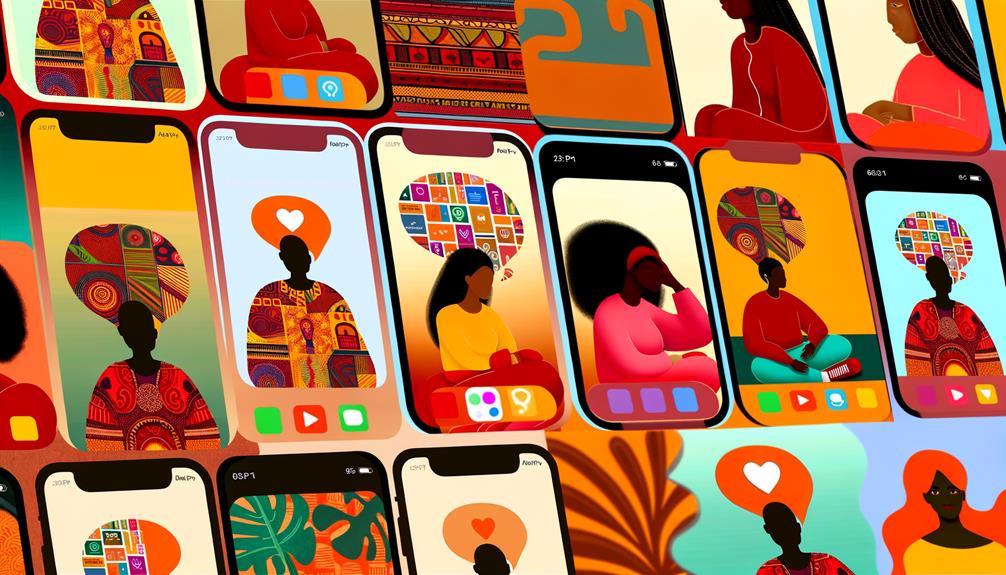You might wonder how mental health apps tailored for the Black community can truly serve as tools for healing. These platforms don't just offer generic advice; they address unique cultural experiences and historical traumas that many face daily. By incorporating culturally sensitive resources and fostering community engagement, apps like "Shine" and "BEAM" promise more than just support—they create spaces where you feel seen and heard. But what makes these apps stand out in addressing stigma and barriers specific to the Black community? There's more to explore about their impact and future trends.
Understanding Cultural Relevance

When it comes to mental health apps for the Black community, understanding cultural relevance is paramount. You know that your cultural identity shapes your experiences and how you interact with the world. It's crucial that mental health resources acknowledge and integrate this into their framework.
These apps should address intersectional wellness, recognizing that multiple aspects of your identity impact your mental health. This includes considering how historical trauma has affected your community and continues to influence your mental well-being today.
Representation matters in these tools. You deserve to see yourself reflected in the resources you use. When apps feature professionals and content that resonate with your lived experiences, it fosters a sense of belonging and understanding that's often missing in mainstream resources.
It's about more than just seeing someone who looks like you; it's about feeling seen and heard on a deeper level.
Holistic approaches that incorporate communal healing practices are essential. They should honor traditional and modern methods that have supported your community for generations.
Key Features of Tailored Apps
Building on the importance of cultural relevance, let's explore the key features that make mental health apps truly tailored for the Black community.
First, cultural sensitivity is at the heart of these apps. They're designed to understand and respect the unique experiences and challenges faced by Black individuals, ensuring that the content resonates deeply and authentically.
User feedback plays a critical role in shaping these apps. By actively incorporating suggestions and concerns from the community, developers can enhance features and refine the user experience to be more inclusive and effective.
Ensuring app accessibility is crucial too. The best apps work across various devices and are easy to navigate, making mental health support reachable for all users, regardless of their tech proficiency.
Feature diversity is another key aspect. These apps offer a range of tools, from guided meditations rooted in cultural practices to forums for community support, ensuring users find what suits them best.
Privacy concerns are addressed through robust security measures, offering peace of mind that personal data remains confidential.
Popular Apps for Black Users

Among the wealth of mental health resources available today, several apps stand out for their dedication to supporting the Black community. These apps focus on understanding unique cultural experiences and offer personalized self care strategies to help you navigate life's challenges.
For instance, the app "Shine" provides daily motivational messages and meditations designed with you in mind, focusing on issues like racial trauma and stress. Users rave about its affirmations and guided practices, which have become an integral part of their healing journey.
Another noteworthy app is "BEAM" (Black Emotional and Mental Health Collective), which emphasizes education and peer support. It offers resources tailored to your specific needs and connects you with a community that understands your experiences.
User testimonials often highlight the comfort and empowerment they find through connecting with others who share similar backgrounds and struggles.
"MindRight" is also making waves by providing culturally responsive coaching and support via text. Users appreciate its convenience and the non-judgmental space it offers.
These apps aren't just tools; they're lifelines that promote self care strategies and foster resilience, reminding you that you're not alone in your journey toward mental wellness.
Addressing Stigma and Barriers
Navigating mental health challenges in the Black community often involves confronting deeply rooted stigma and overcoming various barriers. You might feel pressure to keep your struggles private, fearing judgment or misunderstanding from those around you.
Stigma reduction is crucial in creating an environment where you feel safe seeking help. Mental health apps tailored for the Black community can play a significant role in addressing this. They offer culturally relevant resources and anonymous support, making it easier to reach out without fear of stigma.
Barrier identification is another key aspect. Sometimes, you might face systemic obstacles, such as lack of access to culturally competent care or financial constraints.
These apps often provide affordable or free resources and connect you with professionals who understand your unique experiences. By recognizing and addressing these barriers, these tools empower you to take charge of your mental health journey.
Community Support and Engagement

Community support's power in the Black community plays a vital role in mental health and well-being. You're not alone in navigating life's challenges, and reaching out to others who understand your experiences can be a lifeline.
Community healing fosters a sense of belonging, where shared experiences and cultural connections offer comfort and strength. Mental health apps designed for the Black community can provide a virtual space for this support, connecting you with peers and professionals who understand your unique journey.
Engaging with a community that values cultural connection is essential. These apps often include forums and group chats that allow you to share your story, listen to others, and find solace in knowing you're not isolated in your struggles.
This engagement can lead to personal growth and collective healing, empowering you to face challenges with resilience and compassion.
Future Trends in Mental Health Apps
The landscape of mental health apps is rapidly evolving, offering exciting possibilities for the future. You can expect more personalized experiences as AI advancements play a significant role in tailoring these apps to better meet your unique needs.
Apps will likely harness machine learning to analyze user feedback, so they can understand what truly works for you and what doesn't. This means that your voice becomes a crucial part of shaping how these tools evolve, ensuring they're more effective and inclusive.
Imagine a future where an app understands your specific cultural context and provides resources that resonate with you. This is where AI can shine, using data from diverse communities to refine its support offerings.
These advancements will help break down barriers and make mental health resources more accessible and relatable for the Black community.
As you continue your journey toward mental wellness, your input will help drive meaningful change. Providing honest feedback will ensure these apps grow and adapt in ways that serve you best.
With technology evolving, mental health support can become more inclusive and responsive, creating a future where you feel seen, heard, and supported in every step.
Conclusion
You've explored how mental health apps tailored for the Black community offer crucial support by respecting cultural nuances and addressing historical trauma. By embracing these platforms, you can find culturally sensitive resources and join supportive communities that truly understand your experiences. These apps break down stigmas and barriers, empowering you to take charge of your mental health journey. As technology advances, you can expect even more innovative tools to help you heal and thrive with confidence and resilience.


